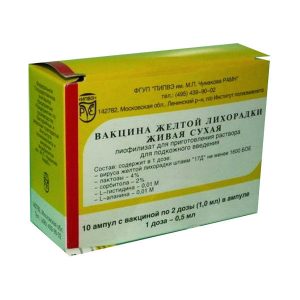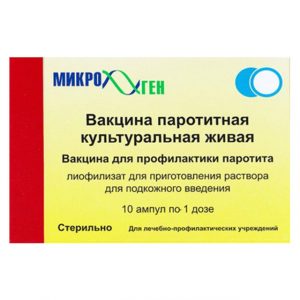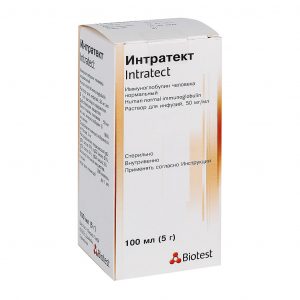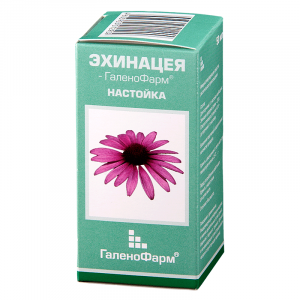Description
Release form
Suspension for intramuscular administration
Packaging
1 bottle.
Pharmacological action
Conducting a full course of vaccination leads to the formation of specific antibodies to four types of HPV – 6, 11, 16 and 18 – in a protective titer in more than 99% of vaccinees for a period of at least 36 months in all age groups.
Gardasil vaccine has almost 100% efficacy in preventing induced 6, 11, 16 and 18 types of HPV cancers of the genital organs, precancerous epithelial dysplasias and genital warts.
Indications
– Prevention of the following diseases caused by the human papillomavirus types 6, 11, 16 and 18 in children and adolescents aged 9 to 17 years and in young women aged 18 to 26 years: – Cancer of the cervix, vulva and vagina.
– Genital warts (condiloma acuminata).
– Prevention of precancerous dysplastic conditions in children and adolescents aged 9 to 17 years and young women aged 18 to 26 years: – In situ cervical adenocarcinomas (AIS).
– Cervical intraepithelial neoplasia of the 2nd and 3rd degree (CIN 2/3).
– Intraepithelial neoplasia of the vulva 2 and 3 degrees (VIN 2/3).
– Intraepithelial neoplasia of the vagina 2 and 3 degrees (VaIN 2/3).
– Cervical intraepithelial neoplasia of the 1st degree (CIN 1).
Contraindications
Hypersensitivity to the active ingredients and excipients of the vaccine.
If symptoms of hypersensitivity occur after administration of the Gardasil vaccine, administration of a subsequent dose of the vaccine is contraindicated.
Blood coagulation disorders due to hemophilia, thrombocytopenia or while taking anticoagulants are a relative contraindication to the intramuscular administration of the Gardasil vaccine, unless the potential benefits of vaccination do not significantly exceed the risks associated with it. If the choice is made in favor of vaccination, measures must be taken to reduce the risk of post-injection hematoma.
Use during pregnancy and lactation
There have been no specially designed and well-controlled studies in pregnant women. The potential effect of the vaccine on the reproductive function of women and the fetus in pregnant women has not been studied.
There is no evidence that vaccine administration has an adverse effect on fertility, pregnancy, or the fetus.
The vaccine can be given to lactating women.
Special instructions
Subcutaneous and intradermal vaccine administration has not been studied and therefore is not recommended.
Gardasil vaccine is not intended for the treatment of: cervical, vulvar or vaginal cancer, CIN, VIN or VaIN, or active condylomatosis. The drug does not protect against diseases caused by HPV of other types and other etiologies.
As with any injectable vaccine, you must always have the appropriate medicines available in case you develop a rare anaphylactic reaction to the vaccine.
The decision to administer the drug or to delay vaccination in connection with an ongoing or recent illness accompanied by fever, to a large extent depends on the etiology of the disease and its severity. A slight fever and mild upper respiratory tract infection are usually not contraindications for vaccination.
In individuals with impaired reactivity of the immune system due to the use of immunosuppressive therapy (systemic corticosteroids, antimetabolites, alkylating agents, cytotoxic drugs), a genetic defect, human immunodeficiency virus (HIV) infection and other causes, the protective effect may be reduced.
Gardasil vaccine should be administered with caution to individuals with thrombocytopenia and any blood clotting disorder, as bleeding may develop after intramuscular injection.
Medical personnel are required to provide all necessary information on vaccination and vaccine to patients, parents and carers, including information on the benefits and associated risks.
The vaccinees should be warned about the need to prevent pregnancy during the course of the vaccination, the need to inform the doctor or nurse of any adverse reactions, and that the vaccination does not replace or cancel the routine screening examinations. To achieve effective results, the vaccination course should be completed completely, if there are no contraindications for this.
Composition
One dose (0.5 ml) contains: Active substances – immunogens: Recombinant antigens: L1 protein of human papillomavirus in the following proportions: type 6 (20 ?g), type 11 (40 ?g), type 16 (40 mcg), type 18 (20 mcg).
Excipients: Aluminum in the form of adjuvant-aluminum amorphous hydroxyphosphate sulfate -225 ?g, sodium chloride -9.56 mg, L-histidine -0.78 mg, polysorbate – 80 – 50 ?g, sodium borate – 35 ?g, water for injection.
Dosage and Administration
The Gardasil vaccine is administered intramuscularly into the deltoid muscle or the anterolateral thigh.
Do not administer intravenously.
A single dose of the vaccine for all age groups is 0.5 ml.
The recommended course of vaccination consists of 3 doses and is carried out according to the
scheme (0 – 2 – 6 months): The first dose is on the appointed day.
Second dose – 2 months after the first.
The third dose is 6 months after the first.
An accelerated vaccination regimen is allowed, in which the second dose is administered after 1 month, and the third after 3 months. after the first vaccination.
If the interval between vaccinations is violated, the vaccination course is considered completed, if three vaccinations are given within 1 year.
Overdose
There are reports of cases of administration of the Gardasil vaccine in doses exceeding the recommended ones. In general, the nature and severity of adverse events in case of an overdose were comparable to those with the introduction of the recommended single doses of this vaccine.
Storage Conditions
At +2 to +8 ° C, in a dark place.
Active ingredient
Vaccine for the prevention of viral hepatitis B 18)
Terms of delivery from
pharmacies Prescription
Form of Treatment
suspension dlya inaektsiy
Merk Sharp and Doom BV, USA




